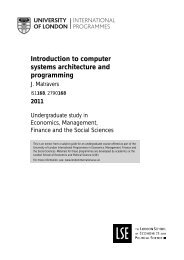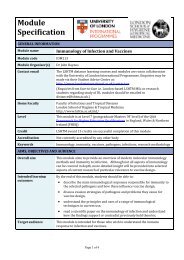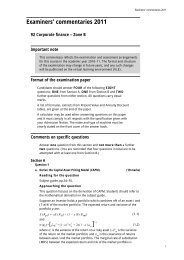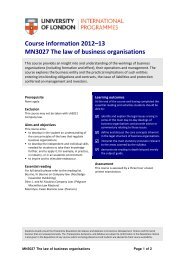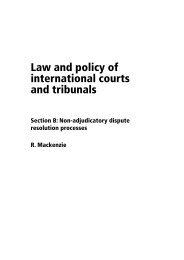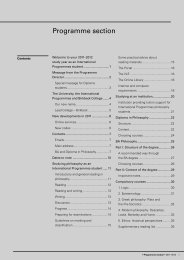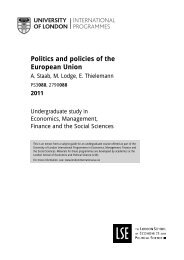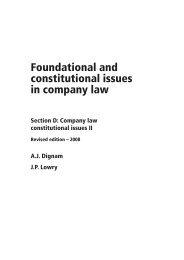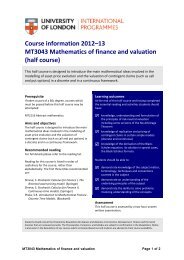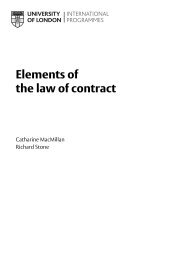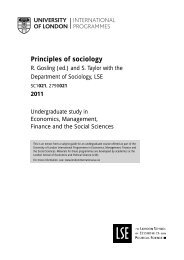Public law - University of London International Programmes
Public law - University of London International Programmes
Public law - University of London International Programmes
You also want an ePaper? Increase the reach of your titles
YUMPU automatically turns print PDFs into web optimized ePapers that Google loves.
page 38 <strong>University</strong> <strong>of</strong> <strong>London</strong> <strong>International</strong> <strong>Programmes</strong><br />
Introduction<br />
… separation <strong>of</strong> powers, together with the rule <strong>of</strong> <strong>law</strong> and parliamentary sovereignty, runs<br />
like a thread throughout the constitution <strong>of</strong> the United Kingdom. (Barnett, Chapter 4: ‘The<br />
separation <strong>of</strong> powers’, Section: ‘Introduction’, p.72)<br />
The separation <strong>of</strong> powers is a constitutional principle designed to ensure that<br />
the functions, personnel and powers <strong>of</strong> the major institutions <strong>of</strong> the state are not<br />
concentrated in any one body. It ensures a diffusion rather than a concentration <strong>of</strong><br />
power within the state. Under the uncodified, largely unwritten British constitution<br />
there is no strict separation <strong>of</strong> powers. Instead, while some separation <strong>of</strong> powers<br />
exists, it is more accurate to speak <strong>of</strong> a system <strong>of</strong> checks and balances which ensures<br />
that powers are not abused. The fundamental purpose <strong>of</strong> the separation <strong>of</strong> powers is<br />
to avoid the abuse <strong>of</strong> power and thereby to protect the rights and liberties <strong>of</strong> citizens.<br />
The concept itself is <strong>of</strong> great antiquity and can be attributed to Aristotle (384–322 BC);<br />
however, the clearest exposition <strong>of</strong> the doctrine can be found in the French writer<br />
Charles-Louis de Montesquieu’s De l’esprit des lois (1748) † . In essence, Montesquieu<br />
states that the three organs <strong>of</strong> government – the executive, legislature and judiciary –<br />
should each have a discrete and defined area <strong>of</strong> power and that there should be a clear<br />
demarcation <strong>of</strong> functions between them: this is true ‘separation <strong>of</strong> powers’.<br />
Under a written constitution, the powers allocated to various institutions will be<br />
clearly defined. In the UK – in the absence <strong>of</strong> such a document – the issue that requires<br />
evaluation is the manner in which and the extent to which differing functions are<br />
kept separate. For the purpose <strong>of</strong> analysis, the subject may be further broken down by<br />
considering the extent to which the executive and legislature, executive and judiciary,<br />
and judiciary and legislature overlap and interact. It should be noted that even under a<br />
written constitution a complete separation <strong>of</strong> powers is not possible, and that without<br />
some degree <strong>of</strong> interaction between the institutions there would be constitutional<br />
deadlock.<br />
Essential reading<br />
Barnett, Chapter 4: ‘The separation <strong>of</strong> powers’.<br />
Learning outcomes<br />
By the end <strong>of</strong> this chapter and the relevant readings you should be able to:<br />
explain the constitutional significance <strong>of</strong> the separation <strong>of</strong> powers<br />
outline the powers and functions <strong>of</strong> the major institutions<br />
identify those areas where functions, personnel and powers overlap<br />
describe the conventional rules that prevent abuse <strong>of</strong> power<br />
critically assess the relevance <strong>of</strong> separation <strong>of</strong> powers under the constitution.<br />
†<br />
De l’esprit de lois (French) =<br />
‘On the spirit <strong>of</strong> the <strong>law</strong>s’.<br />
A portrait <strong>of</strong> Montesquieu.<br />
Image courtesy <strong>of</strong> Wikipedia<br />
Commons.



